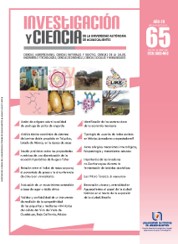Edible coating evaluation based on agar and citric acid
DOI:
https://doi.org/10.33064/iycuaa2015653580Keywords:
potato, edible coating, agar, glycerol, citric acidAbstract
The performance of an edible coating based on agar and citric acid over potato (Solanum tuberosum) was evaluated. The potatoes were tried by immersion with solutions of Agar (A), Agar-Citric acid (AC), AgarGlycerol (AG), and a mixture of the three (ACG). AC
based film showed the lowest thickness values and rate of water vapor transmission. Coating the fruit with AC reduced 1.57 times weight loss compared to the control. Moreover, AC showed higher brightness values, chrome, kept the sensory characteristics
and reduced the presence of potato sprouts after 6 days at 20 °C. In scanning electron microscopy no substantial morphological changes were observed in potatoes with the applied treatments. The results show that the formulation based on agar and citric
acid (AC) had the characteristics of semipermeable film and edible coating.
Downloads
References
• AGUILAR MÉNDEZ, M. A. Propiedades físicas y mecánicas de películas biodegradables y su empleo en el recubrimiento de frutos de aguacate. Tesis, México, D. F.: CICATA-IPN, 51-96, 2005.
• ALLENDE, A. et al. Role of commercial sanitizers and washing systems on epiphytic microorganisms and sensory quality of fresh-cut escarole and lettuce. Postharvest Biology and Technology, 49(1):155-163, 2008.
• A.O.A.C. Official Methods of Analysis Association of Official Analytical Chemists. Washington, DC, 1984.
• AYRANCI, E. y TUNC, S. A method for the measurement of the oxygen permeability and the development of edible films to reduce the rate of oxidative reactions in fresh foods. Food Chemistry, 80: 423-431, 2003.
• BERTUZZI, M. A. et al. Water vapor permeability of edible starch based films. Journal of Food Engineering, 80(3): 972-978, 2007.
• FAMÁ, L. et al. Películas comestibles de aplicación industrial. Jornadas SAM/CONAMET/SIMPOSIO MATERIA, Centro atómico Bariloche, Río Negro, Argentina, 898-901, 2003.
• FAZEL, M. et al. Effects of salep, glycerol and sunflower oil on potato starch-based edible film. Iranian Journal of Nutrition Sciences & Food Technology, 6(4): 93-102, 2012.
• GARCÍA, M. A. et al. Lipid addition to improve barrier properties of edible starch-based films and coatings. Journal of Food Science, 65(6): 941-947, 2000.
• GLENN, G. M. et al. Controlled release of 2-heptanone using starch gel and polycaprolactone matrices and polymeric films. Polymers for Advanced Technologies, 18(8): 636-642, 2007.
• HUANG, Y. y CHEN, H. Effect of organic acids, hydrogen peroxide and mild heat on inactivation of Escherichia coli O157:H7 on baby spinach. Food Control, 22(8): 1178-1183, 2011.
• KOSKINEN M. et al. Effect of pretreatment on the film forming properties of potato and barley starch dispersions. Industrial Crops and Products, 5(1): 23-34, 1996.
• LIRIA DOMÍNGUEZ, M. A. Pruebas discriminatorias. Cap.4. Guía para la evaluación sensorial de alimentos (pp. 12). Lima, Perú: Agrosalud, 2007.
• LÓPEZ DE LACEY, A. M. et al. Agar films containing green tea extract and probiotic bacteria for extending fish shelf-life. LWT - Food Science and Technology, 55(2): 559-564, 2014.
• MADERA SANTANA, T. J. et al. Physicochemical properties of biodegradable polyvinyl alcohol-agar films from red algae Hydropuntia cornea. Marine Biotechnology, 13(4): 793-800, 2011.
• MADERA SANTANA, T. J. et al. Preparation and characterization of biodegradable Agar/Poly(butylene adipate-co-terephatalate) omposites. Polymer Engineering and Science, 49(6): 1117-1126, 2009.
• MINOLTA. Precise Color Communication. Color control for feeling to instrumentation. [Booklet]. Osaka, Japan: Minolta, 18, 1994.
• NIETO, M. B. Structure and function of polysaccharide gum-based edible films and coatings. En K. C. Huber y M. E. Embuscado (Eds.), Edible films and coatings for food applications (pp. 57-112). New York: Springer, 2009.
• SAAVEDRA, H. y ALGECIRA, E. Evaluación de películas comestibles de almidón de yuca y proteína aislada de soya en la conservación de fresas. Publicación científica en ciencias biomédicas - NOVA, 8(14): 171-182, 2010.
• TALJA, R. A. et al. Effect of various polyols and polyol contents on physical and mechanical properties of potato starchbased films. Carbohydrate Polymers, 67(3): 288-295, 2007.
• VIRTO, R. et al. Inactivation kinetics of Yersinia enterocolitica by citric and lactic acid at different temperatures. International Journal of Food Microbiology, 103(3): 251-257, 2005.
Downloads
Published
How to Cite
License
Copyright (c) 2015 Jorge Nemesio Mercado Ruiz, Tomás Jesús Madera Santana, Juan Yocupicio Yevismea

This work is licensed under a Creative Commons Attribution-NonCommercial-ShareAlike 4.0 International License.
Las obras publicadas en versión electrónica de la revista están bajo la licencia Creative Commons Atribución-NoComercial-CompartirIgual 4.0 Internacional (CC BY-NC-SA 4.0)
10.3390/agronomy14092109









